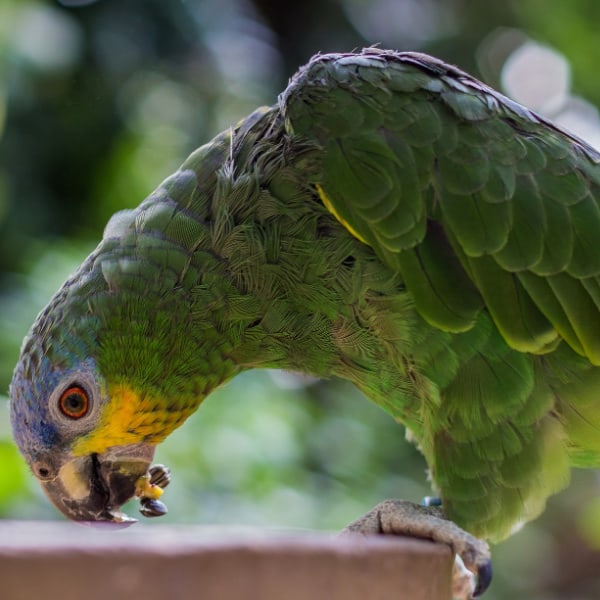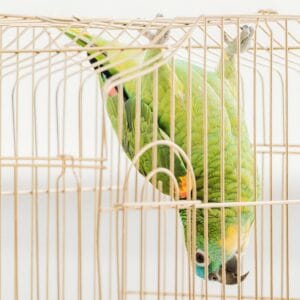Last Updated on by Catherine Tobsing
Following a recent thread on a LinkedIn group regarding behavioral issues with an African Grey I got more, well-upset reading that people are giving their birds “all natural homeopathic remedies” with no thought as to the potential short or long-term consequences.
I questioned how this individual knew a certain Bach Flower Remedy was bird safe. Her answer was “I visited the website that sold it and the site stated, “safe for all animals”.
Begin rant
Here’s the thing Susan. I visited the site and there is no mention of “safe for birds” I’d just like to point out that birds’ digestive systems are far different than mammals and any chemical you put into a bird’s body via its mouth sits unprocessed – undigested in their crop for 4 to 6 hours.
My first question is what is the impact do any of these homeopathic remedies while it literally “waits” to be digested?
Advocates of homeopathic remedies are doing in-home calculations on dosages based on human body weights. I saw above that a formula was given to a bird by determining the bird was 1/130th of your body weight. Did you take into account that your standing heart rate is 80 and your bird’s standing heart rate is 200?
Do homeopathic remedies get absorbed more quickly in birds after they pass the crop than in humans?
Because homeopathic ingredients are not regulated by any governmental agency how do you know your Bach Flower has the same concentration as another manufacturer?
How were the oils extracted what process was used – Enfleurage, Expressed Oils, Steam Distillation, Solvent Extraction, Fractional Distillation and Percolation, Carbon Dioxide Extraction, Phytonic Process? It’s all a guessing game.
I also put the question out there – why don’t high-end bird food manufacturers like Harrisons, Goldenfeast or Hagen offer ANY homeopathic remedies. They have the distribution so it would be very easy for retailers like me to sell.
The short answer is no research has been done on the impact of any of these homeopathic remedies on birds. It’s all anecdotal and no one wants the liability including me (I sell more than 10,000 pounds of bird food monthly).
I work with both psittacine and raptors. My falconry trainer is licensed at both the state and federal level and has been working with raptors for almost half a century he’s never once used a homeopathic remedy for any of his birds
Based on my experience I feel there are better solutions to behavior and health issues than homeopathic remedies for birds. Last year a very long thread on Facebook holistic bird care group relating to birds that got car sick.
Dozens of homeopathic remedies were offered all with the preface “you should try this…..” My simple answer which was ignored was don’t feed the bird for six hours prior to travel which will empty the bird’s crop thereby eliminating any chance of your bird regurgitating during a car trip. A simple solution to a problem with absolutely no guesswork and guaranteed 100% safe.
So as you can guess I’m pretty anti-homeopathic anything for birds. I look at parrots in this way – in the wild, they spend 60% of their time seeking food and 40% of their time trying not to be food. We bring them into our home and where in the wild they will spend 4 to 6 hours a day seeking (foraging) food whereas we offer them unlimited amounts of food in the bowls and the feeding is accomplished in 10 or 15 min. and then we wonder why they exhibit self-destructive issues like feather plucking.
Birds are extraordinarily different than any other animals on the planet in so many ways be it intelligence, the respiratory system, the digestive system, and the fact that they can fly an ability most bird keepers today immediately steal away from a bird by clipping their wings rather than taking the time to teach them how to fly properly.
So circling back to the original issue I’ll just ask one question rhetorically. Can you tell me with absolute certainty that by using these homeopathic remedies on your birds you’re not cutting their lifespan by 50%?
End rant
MitchR
Author Profile
Latest entries
 Feeding Exotic BirdsDecember 29, 2025How to Switch or Convert Your Bird From Seeds to Pellets: Real-Life Case Studies and Practical Guidance
Feeding Exotic BirdsDecember 29, 2025How to Switch or Convert Your Bird From Seeds to Pellets: Real-Life Case Studies and Practical Guidance Feeding Exotic BirdsDecember 16, 2025A Practical, Budget-Smart Guide to Feeding Birds Well
Feeding Exotic BirdsDecember 16, 2025A Practical, Budget-Smart Guide to Feeding Birds Well Bird EnviornmentsDecember 7, 2025Understanding Budgie Cage Bar Orientation: Myths, Realities & Practical Solutions for Vertical-Bar Bird Cages
Bird EnviornmentsDecember 7, 2025Understanding Budgie Cage Bar Orientation: Myths, Realities & Practical Solutions for Vertical-Bar Bird Cages Feeding Exotic BirdsDecember 5, 2025How Dr. T.J. Lafeber Rewrote the Future of Pet Bird Nutrition
Feeding Exotic BirdsDecember 5, 2025How Dr. T.J. Lafeber Rewrote the Future of Pet Bird Nutrition



